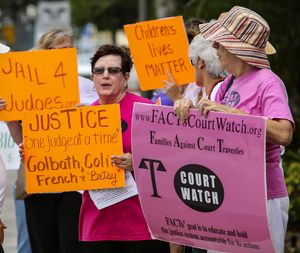Florida: Seniors protest at Palm Beach County Courthouse and SB 232 passes unanimously
 Sheila Jaffe (left) and Natalie Andre (right), President of FACTS (Families Against Court Travesties), protest with a group of people about the state of guardianship outside the South County Courthouse in Delray Beach February 24, 2016. (Lannis Waters / The Palm Beach Post)
Sheila Jaffe (left) and Natalie Andre (right), President of FACTS (Families Against Court Travesties), protest with a group of people about the state of guardianship outside the South County Courthouse in Delray Beach February 24, 2016. (Lannis Waters / The Palm Beach Post)
By John Pacenti Palm Beach Post Staff Writer
In the wake of numerous reports of abuse of incapacitated seniors by court-appointed professional guardians, the Florida House on Wednesday sent a bill to Gov. Rick Scott that for the first time would exert regulatory authority over a burgeoning industry that some critics dub “elder cleansing.”
On the same day, protesters marched outside of the Palm Beach County Courthouse in Delray Beach, calling for judicial reform.
The Legislature’s action follows media reports about professional guardians interested in draining the savings of incapacitated seniors through fees for themselves and the cadre of elder law attorneys who represent them. The Palm Beach Post’s series Guardianship: A Broken Trust in January brought to public attention the role of the judiciary in guardianship of the elderly — many with dementia — who no longer can care for themselves.
As a result, Palm Beach County Chief Circuit Judge Jeffrey Colbath transferred Circuit Judge Martin Colin out of the Probate & Guardianship Division. Colin’s wife, Elizabeth “Betsy” Savitt, works as a professional guardian, compiling complaints from families of taking tens of thousands of dollars in fees without court approval. The chief judge required the south county judges to recuse themselves from her cases.
Under guardianships, seniors found by the court to be incapacitated often lose all legal rights to make decisions for themselves. When a family member is not available or they can’t agree on what to do, a judge can appoint professional guardians to make decisions on finances, medical care and housing for the senior.
Power to discipline
The legislation creates an Office of Public and Professional Guardians and for the first time requires standard practices and rules for professional guardians be created. It also gives the office enforcement power, including the ability to revoke a guardian’s registration.
Anybody can become a professional guardian with such vast powers over a senior’s life simply by going through a credit and criminal background check and 40 hours of training. The ranks of these professionals have risen from 108 in 2003 to 457 last year, according to the Department of Elder Affairs.
Elizabeth “Betsy” Savitt, Judge Colin’s wife and a professional guardian Guardianship reform started last year when lawmakers, among other changes, imposed criminal penalties for exploitation or abuse.
Rep. Mark Pafford, DWest Palm Beach, said problems with court-appointed professional guardians in Florida have been festering for decades and the new law will provide incapacitated adults a level of trust.
“Hopefully when this is in place over the next couple of years, it can be improved to provide the best oversight or security for people who may be in a very delicate spot,” Pafford said.





